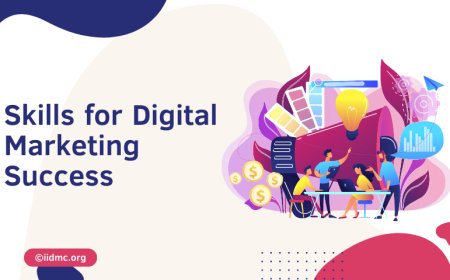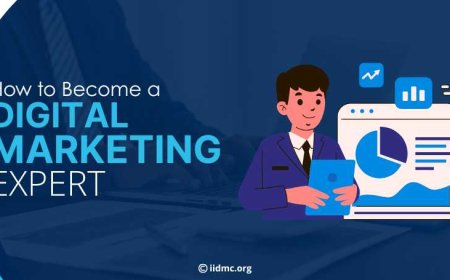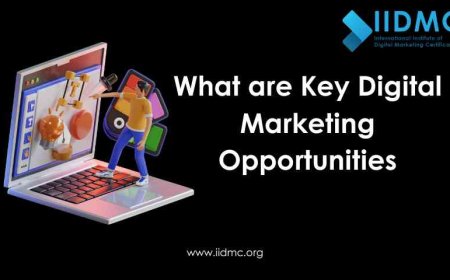Digital marketing course for beginners
Unlock your potential as a Certified Social Media Specialist with expert tips, essential skills, and top certification courses. Discover the benefits of certification, career advancement opportunities, and how to stand out in the competitive social media industry.
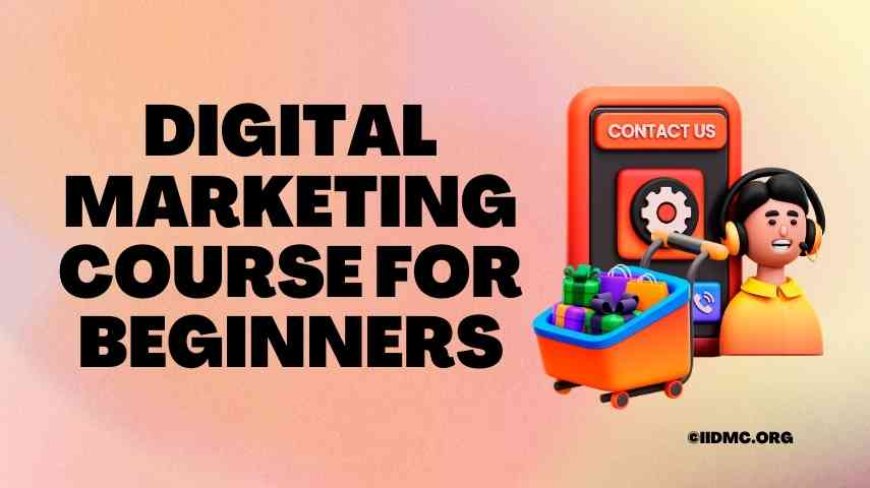
In today's fast-paced digital world, businesses of all sizes are leveraging the power of online platforms to reach their target audience and drive growth. If you're new to the field and looking to get started, our Digital Marketing Course for Beginners is the perfect way to dive in. Whether you're an aspiring marketer, entrepreneur, or simply looking to expand your skill set, this course will guide you through the fundamentals of SEO, social media, PPC, email marketing, and more. With easy-to-follow lessons and practical insights, you'll gain the essential knowledge needed to kick-start your digital marketing journey and stay ahead in the evolving digital world.
What is Digital Marketing?
Digital marketing refers to the use of digital channels such as search engines, social media, email, websites, and mobile apps to promote products or services. It involves leveraging various online platforms to connect with target audiences, drive traffic, generate leads, and increase sales. Digital marketing encompasses a wide range of strategies, including content marketing, search engine optimization (SEO), social media marketing, email campaigns, paid advertising (PPC), and more.
Key Differences Between Digital Marketing and Traditional Marketing
-
Channels:
-
Digital marketing uses online platforms like websites, social media, and email.
-
Traditional marketing uses offline methods like print ads, billboards, TV, and radio.
-
Targeting:
-
Digital marketing offers precise audience targeting through data-driven insights (demographics, behavior, location).
-
Traditional marketing generally targets a broader audience with less precision.
-
Measurability:
-
Digital marketing allows real-time tracking of campaigns, making it easier to measure ROI and adjust strategies.
-
Traditional marketing is harder to measure accurately, with delayed feedback on results.
-
Cost:
-
Digital marketing is often more cost-effective and flexible, allowing businesses to scale budgets according to needs.
-
Traditional marketing usually requires a larger investment with higher upfront costs.
Importance of Digital Marketing
Digital marketing is crucial for businesses today because it provides direct access to a vast online audience, allowing for targeted, personalized marketing efforts. It helps businesses of all sizes reach potential customers on platforms where they spend the majority of their time. As consumers increasingly turn to online resources for information and purchasing decisions, digital marketing is essential for maintaining competitiveness, building brand awareness, driving traffic, and achieving measurable growth in today's digital-first world.
Why Should Beginners Take a Digital Marketing Course?
A structured course provides beginners with a clear learning path, simplifying complex concepts like SEO and social media marketing, and offering hands-on experience. It ensures you gain the foundational skills needed to confidently understand digital marketing strategies and apply them effectively.
With the growing demand for digital marketing professionals, taking a course can boost your employability and open up career opportunities in roles like content creation, social media management, and SEO, making it a great investment for career growth.
Core Components of a Digital Marketing Course
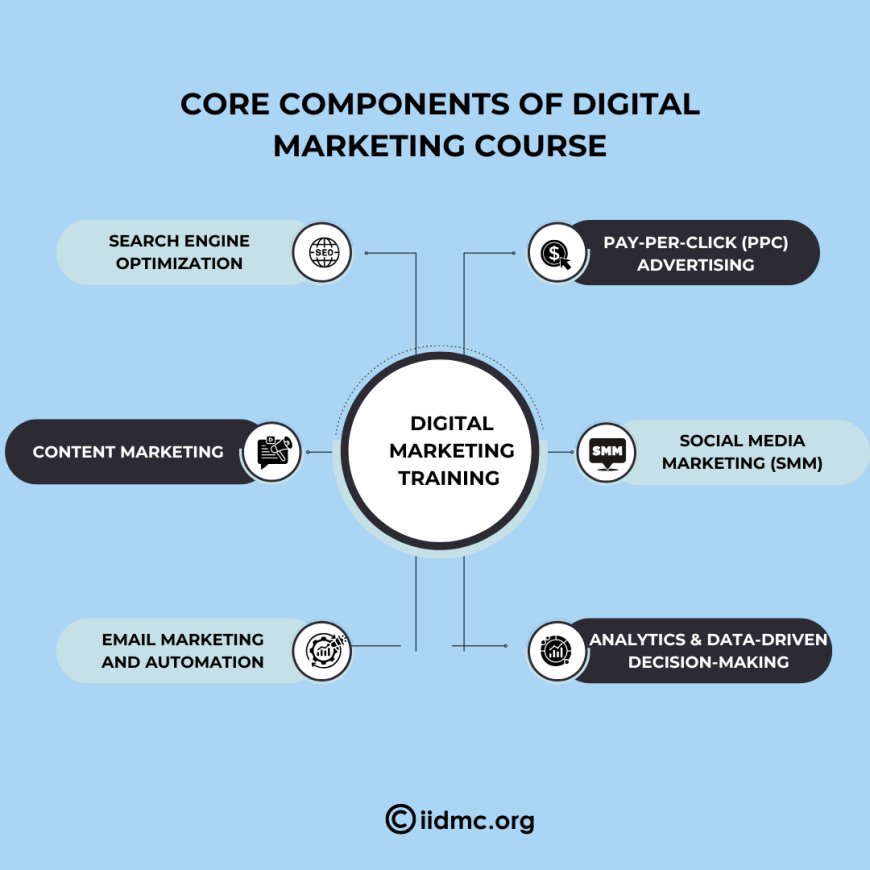
-
SEO (Search Engine Optimization)
-
Learn how search engines rank websites and the basics of keyword research and on-page optimization to improve visibility.
-
PPC (Pay-Per-Click Advertising)
-
Explore platforms like Google Ads and social media ads, and understand key concepts like cost-per-click and conversion tracking.
-
Social Media Marketing
-
Understand the role of social media in a digital strategy, and learn best practices for platforms like Facebook, Instagram, and LinkedIn.
-
Discover how to create valuable content like blogs, videos, and infographics to engage audiences and drive traffic.
-
Email Marketing
-
Learn the fundamentals of building email lists and crafting effective email campaigns to nurture leads and drive conversions.
-
Analytics and Reporting
-
Get introduced to tools like Google Analytics, and learn how to measure and improve your marketing strategies based on data.
Practical Skills You'll Gain from a Digital Marketing Course
-
Hands-on Experience with Creating Campaigns
-
Learn to design, implement, and optimize digital marketing campaigns across various platforms.
-
Familiarity with Tools like Google Ads, Hootsuite, and Canva
-
Gain practical experience using essential marketing tools for ads, social media management, and content creation.
-
Real-World Application of Digital Marketing Strategies
-
Apply digital marketing strategies to real-world business scenarios, learning how to drive growth and engagement.
Career Opportunities in Digital Marketing for Beginners
Overview of Entry-Level Job Roles
-
Start your career as a Digital Marketing Assistant, SEO Specialist, Social Media Coordinator, or PPC Analyst, where you’ll implement strategies, manage campaigns, and optimize performance.
Starting Freelancing or Building Your Own Business
-
A digital marketing course equips you with skills to offer freelance services or launch your own digital marketing agency, catering to clients' needs in areas like social media, content creation, and ads management.
Growth Potential in Digital Marketing Fields
-
Digital marketing offers strong career growth, with opportunities to advance into roles like Digital Marketing Manager, Content Strategist, or Performance Marketing Expert, with demand growing across industries.
Choosing the Right Digital Marketing Course for You:
-
Factors to Consider:
-
Look for courses that offer accreditation, comprehensive content, student support, and reasonable pricing to ensure quality and value.
-
Online vs. Offline Learning:
-
Online offers flexibility and a wide range of options, while offline provides in-person interaction and networking opportunities. Weigh the pros and cons based on your learning style and schedule.
-
Importance of Certifications:
-
Certifications from platforms like Google, HubSpot, and Facebook validate your skills and make you more attractive to employers and clients.
-
Tips for Identifying the Best Courses for Beginners:
-
Focus on courses that provide foundational knowledge, hands-on projects, and good reviews from past learners to ensure they meet your learning needs.
Common Challenges Faced by Beginners and How Courses Help:
-
Lack of Clarity on Where to Start:
-
A structured course provides a clear roadmap, helping beginners focus on essential areas like SEO, PPC, and social media marketing.
-
Overwhelming Amount of Information Online:
-
Courses simplify complex topics by offering organized and filtered content, cutting through the overload of online information.
-
Importance of Structured Learning:
-
Structured learning builds skills progressively, boosts confidence, and ensures you're following a proven path to digital marketing success.
Tips for Success in a Digital Marketing Course:
-
Time Management and Consistency
-
Set a study schedule and stick to it. Break lessons into manageable chunks to maintain consistent progress and avoid falling behind.
-
Hands-On Practice with Real Projects
-
Apply what you learn by working on real-world projects. Creating and managing actual campaigns helps reinforce your skills and boosts your confidence.
-
Join Online Communities and Network with Other Learners
-
Participate in online communities and forums related to digital marketing. Networking with fellow learners can provide support, inspiration, and collaborative learning opportunities.
A digital marketing course is the perfect starting point for beginners looking to enter the fast-growing world of online marketing. It provides the structured learning, hands-on experience, and industry-recognized certifications needed to build a solid foundation. By enrolling in a course, you’ll gain essential skills in areas like SEO, social media, PPC, and content marketing, setting you on the path to a successful career.
Take the first step toward your digital marketing journey today and explore beginner-friendly courses, like the International Institute of Digital Marketing's Certified Digital Marketing Master (IIDMC). It’s designed to equip you with the skills and confidence to thrive in this dynamic industry.



























